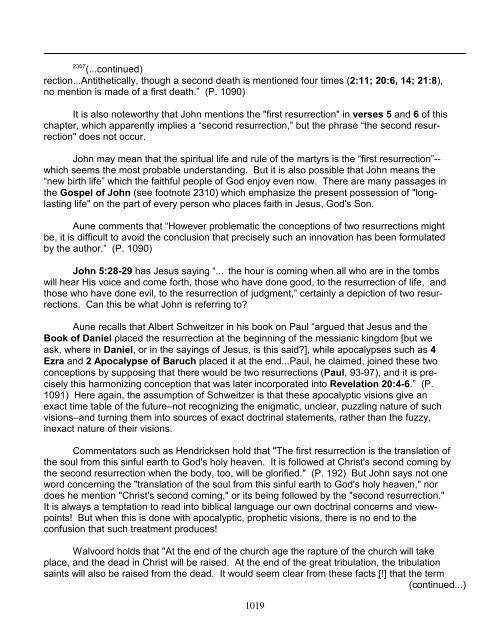Revelation 20 - In Depth Bible Commentaries
Revelation 20 - In Depth Bible Commentaries
Revelation 20 - In Depth Bible Commentaries
Create successful ePaper yourself
Turn your PDF publications into a flip-book with our unique Google optimized e-Paper software.
2307<br />
(...continued)<br />
rection...Antithetically, though a second death is mentioned four times (2:11; <strong>20</strong>:6, 14; 21:8),<br />
no mention is made of a first death.” (P. 1090)<br />
It is also noteworthy that John mentions the "first resurrection" in verses 5 and 6 of this<br />
chapter, which apparently implies a “second resurrection,” but the phrase “the second resurrection"<br />
does not occur.<br />
John may mean that the spiritual life and rule of the martyrs is the “first resurrection”--<br />
which seems the most probable understanding. But it is also possible that John means the<br />
“new birth life” which the faithful people of God enjoy even now. There are many passages in<br />
the Gospel of John (see footnote 2310) which emphasize the present possession of "longlasting<br />
life" on the part of every person who places faith in Jesus, God's Son.<br />
Aune comments that “However problematic the conceptions of two resurrections might<br />
be, it is difficult to avoid the conclusion that precisely such an innovation has been formulated<br />
by the author.” (P. 1090)<br />
John 5:28-29 has Jesus saying “... the hour is coming when all who are in the tombs<br />
will hear His voice and come forth, those who have done good, to the resurrection of life, and<br />
those who have done evil, to the resurrection of judgment,” certainly a depiction of two resurrections.<br />
Can this be what John is referring to?<br />
Aune recalls that Albert Schweitzer in his book on Paul “argued that Jesus and the<br />
Book of Daniel placed the resurrection at the beginning of the messianic kingdom [but we<br />
ask, where in Daniel, or in the sayings of Jesus, is this said?], while apocalypses such as 4<br />
Ezra and 2 Apocalypse of Baruch placed it at the end...Paul, he claimed, joined these two<br />
conceptions by supposing that there would be two resurrections (Paul, 93-97), and it is precisely<br />
this harmonizing conception that was later incorporated into <strong>Revelation</strong> <strong>20</strong>:4-6.” (P.<br />
1091) Here again, the assumption of Schweitzer is that these apocalyptic visions give an<br />
exact time table of the future–not recognizing the enigmatic, unclear, puzzling nature of such<br />
visions–and turning them into sources of exact doctrinal statements, rather than the fuzzy,<br />
inexact nature of their visions.<br />
Commentators such as Hendricksen hold that "The first resurrection is the translation of<br />
the soul from this sinful earth to God's holy heaven. It is followed at Christ's second coming by<br />
the second resurrection when the body, too, will be glorified." (P. 192) But John says not one<br />
word concerning the "translation of the soul from this sinful earth to God's holy heaven," nor<br />
does he mention "Christ's second coming," or its being followed by the "second resurrection."<br />
It is always a temptation to read into biblical language our own doctrinal concerns and viewpoints!<br />
But when this is done with apocalyptic, prophetic visions, there is no end to the<br />
confusion that such treatment produces!<br />
Walvoord holds that "At the end of the church age the rapture of the church will take<br />
place, and the dead in Christ will be raised. At the end of the great tribulation, the tribulation<br />
saints will also be raised from the dead. It would seem clear from these facts [!] that the term<br />
(continued...)<br />
1019

















